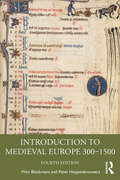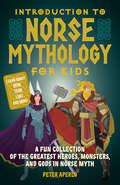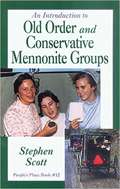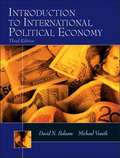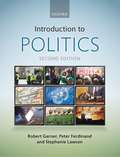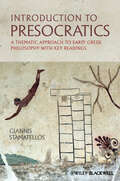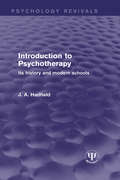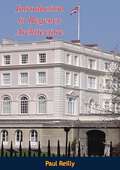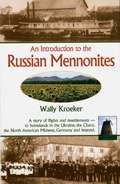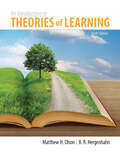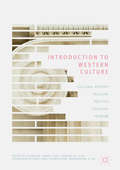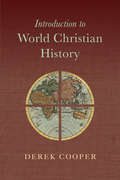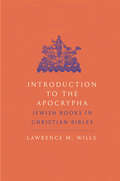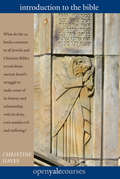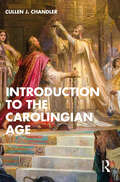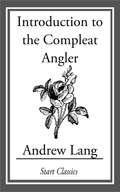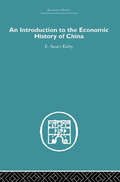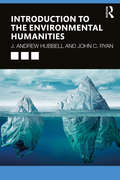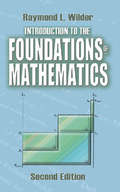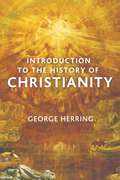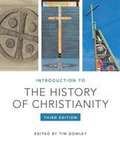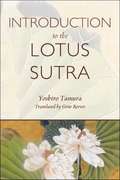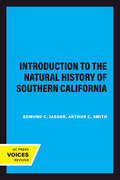- Table View
- List View
Introduction to Medieval Europe 300–1500: Third Edition
by Wim Blockmans Peter HoppenbrouwersIntroduction to Medieval Europe 300–1500 provides a comprehensive survey of this complex and varied formative period of European history within a global context, covering themes as diverse as barbarian migrations, the impact of Christianisation, the formation of nations and states, the emergence of an expansionist commercial economy, the growth of cities, the Crusades, the effects of plague and the intellectual and cultural dynamism of the Middle Ages. The book explores the driving forces behind the formation of medieval society and the directions in which it developed and changed. In doing this, the authors cover a wide geographic expanse, including Western interactions with the Byzantine Empire, the Islamic World, North Africa and Asia. This fourth edition has been fully updated to reflect moves toward teaching the Middle Ages in a global context and contains a wealth of new features and topics that help to bring this fascinating era to life, including: • West Europe’s catching up through intensive exchange with the Mediterranean Islamic world • growth of autonomous cities and civic liberties • emergence of an empirical and rational worldview • climate change and intercontinental pandemics • European exchange with Africa and Asia • chapter introductions to support students’ understanding of the topics • a fully updated glossary to give modern students the confidence and language to discuss medieval history Clear and stimulating, the fourth edition of Introduction to Medieval Europe is the ideal companion to studying the entirety of medieval history at undergraduate level.
Introduction to Norse Mythology for Kids: A Fun Collection of the Greatest Heroes, Monsters, and Gods in Norse and Viking Myth (Norse Myths)
by Peter AperloImmerse yourself in the dangerous, fascinating, and awesome world of Norse heroes, monsters, gods, and goddesses, from Thor and Loki to Odin, Frey, and many more!Get to know the stories behind your favorite Norse heroes, gods, and villains with this in-depth introduction to Norse mythology. Learn all about how Thor got his hammer Mjölnir, or the cunning and mischievous adventures of the trickster Loki. Discover fantastical creatures, fearsome monsters, and epic battles—all from ancient Scandinavia—with stories including: Thor and the Clay Giant The Death of Baldr Loki&’s Dangerous Children And more! Plus, in addition to the mythical tales, you&’ll also learn what daily life was like for Vikings and how they fought. This book is more than just a collection of gods and goddesses, it&’s the perfect collection of Nordic and Viking trivia for any kid who loves to learn about history or for fans of Marvel movies!
Introduction to Old Order and Conservative Mennonite Groups: People's Place Book No. 12 (People's Place Bks.)
by Stephen ScottThis book tells a story which until now has not been available in such an interesting and comprehensive form. What holds these people together? Why are they growing in number? Where do they live? The Old Order Mennonites are less well known than the Amish, but are similar in many beliefs and practices. Some Old Order Mennonites drive horses and buggies. Others use cars for transportation. Conservative Mennonite groups vary a great deal, but in general espouse strong faith and family life and believe that how they live should distinguish them from the larger society around them. The author details courtship and wedding practices, methods of worship, dress, transportation, and vocation. Never before has there been such an inside account of these people and their lives. The author spent years conferring and interviewing members of the various groups, trying to portray their history and their story in a fair and accurate manner. An enjoyable, educational, inspiring book.
Introduction to Political Economy
by David N. Balaam Michael VesethHistory and overview of political economy
Introduction to Politics (Second Edition)
by Robert Garner Peter Ferdinand Stephanie LawsonIntroduction to Politics, Second Edition, provides an intellectually stimulating yet accessible introduction to politics that takes current global realities into account. The text is divided into three sections that reflect the authors' expertise: concepts and ideologies, comparative politics, and international relations.
Introduction to Presocratics: A Thematic Approach to Early Greek Philosophy with Key Readings
by Giannis StamatellosIntroduction to Presocratics presents a succinct introduction to Greek thinkers of the 6th and 5th century BCE and a thematic exploration of the topics and enquiries opened by these first philosophers and scientists of the Western tradition. Offers a concise, thematically organized introduction to the Presocratics Includes a previously unpublished translation of the main fragments of the Presocratics by Classics scholar Rosemary Wright Covers key figures including Thales, Anaximander and Anaximenes of Miletus, Xenophanes, Heraclitus, Pythagoras, Parmenides and Zeno of Elea, Empedocles, Anaxagoras and Democritus Supplemented with helpful features including a timeline, map of the ancient world, glossary of terms, and index of proper names
Introduction to Psychotherapy: Its History and Modern Schools (Psychology Revivals)
by J. A. HadfieldFirst published in 1967, the original blurb reads: This book is intended to give the intelligent lay reader a comprehensive view of the subject of psychotherapy, the treatment of nervous disorders by mental means. These disorders are of increasing importance on account of their wide-spread nature and of the misery they produce. It describes the development of psychotherapy as employed by the most primitive peoples and races, through animal magnetism and hypnotism to the more modern analytical schools of Freud, Jung and Adler. It sets out in particular to give the positive contributions of these various systems, although this does not preclude criticism of their weaknesses and more dubious theories. Dr Hadfield has had the widest experience, having treated psychoneurotic disorders for over fifty years, including the war neuroses in the two world wars, both in the Navy and in the Army; and, as Lecturer in the University of London in the subject for over forty years, he has had the opportunity to systematize the knowledge thus obtained. As a result of this experience he has come to conclusions as to the nature, causes and treatment of such disorders differing somewhat from those of the established Schools, and it is these findings which are given in the latter part of the book under the title, ‘Direct Reductive Analysis’. The book will be useful to all those – teachers and parsons as well as medicals – who have to deal with human beings and their aberrations, and to them it is addressed.
Introduction to Regency Architecture
by Paul ReillyWith this book, author Paul Reilly had two ends in view. The first is to introduce the ever fewer examples of Regency buildings while they still exist. The second is to explain the historical role of Regency architecture, to show in what way it was a true descendant of the 18th century and in what way it broke new ground.
Introduction to Russian Mennonites: A Story Of Flights And Resettlements-- To Homelands In The Ukraine, The Chaco, T
by Wally KroekerMennonites in Russia? Invited by Catherine the Great to farm the Russian steppes -- in exchange for exemption from military service -- Mennonite emigrants from Polish Prussia and The Netherlands made their home in Russia. Some remain today; many more eventually left for North and South Americas and Europe. Nearly all retain memories and stories from that place -- unbelievable prosperity for some; unspeakable terror for many; church tensions; struggles between the landed and the landless; exquisite clockmaking, storytelling, musicmaking, and food. Himself a Russian Mennonite, Kroeker heads into the history, but also the later movement of these people to the U.S. and Canada. Are they at all distinctive today? What has drawn some to the cities and professions, and others to the rural prairies? What about those in Europe, and those still in the former Soviet Union? Kroeker tells it all with vibrancy -- the overview and the memorable details. Includes dozens of historic and contemporary photographs.Skyhorse Publishing, as well as our Arcade imprint, are proud to publish a broad range of books for readers interested in history--books about World War II, the Third Reich, Hitler and his henchmen, the JFK assassination, conspiracies, the American Civil War, the American Revolution, gladiators, Vikings, ancient Rome, medieval times, the old West, and much more. While not every title we publish becomes a New York Times bestseller or a national bestseller, we are committed to books on subjects that are sometimes overlooked and to authors whose work might not otherwise find a home.
Introduction to St. Thomas Aquinas
by Anton C. Pegis St. Thomas AquinasThe comparatively short life of St. Thomas Aquinas covers the second and third quarters of the thirteenth century. At the beginning of his life, Greek and Arabian philosophy was just entering the Latin world; three years after his death, the large-scale condemnation of Aristotelianism in Paris by Bishop Stephen Tempier signalized what turned out to be a defeat for Christian thinkers in the presence of Greek and Arabian philosophers, Platonists and Aristotelians
Introduction to Theories of Learning: Ninth Edition
by Matthew H. OlsonDefines learning and shows how the learning process is studied. Clearly written and user-friendly, Introduction to the Theories of Learning places learning in its historical perspective and provides appreciation for the figures and theories that have shaped 100 years of learning theory research. The 9th edition has been updated with the most current research in the field. With Pearson's MySearchLab with interactive eText and Experiment's Tool, this program is more user-friendly than ever. Learning Goals Upon completing this book, readers should be able to: Define learning and show how the learning process is studied Place learning theory in historical perspective Present essential features of the major theories of learning with implications for educational practice Note: MySearchLab does not come automatically packaged with this text. To purchase MySearchLab, please visit: www.mysearchlab.com or you can purchase a ValuePack of the text + MySearchLab (at no additional cost).
Introduction to Water in California
by David CarleThis book is a natural history guide, but one that recognizes the overwhelming role of humanity in the story of California water. The focus here is on a contemporary understanding of the natural waterscape and watersheds of the state and of the extended watersheds that people created by redirecting water across the West. The goal is to help Californians better appreciate the water that emerges from their taps, what it takes to move it there, and what changes occur in environments along the way.
Introduction to Western Culture: Cultural History, Religion, Politics, Folklore And Tourism
by Guobin Xu Yanhui Chen Lianhua XuPromoting cultural understanding in a globalized world, this collection provides a concise and unique introduction to Western culture, through the voices of Chinese scholars. Written by a team of experts in their fields, the book provides insights into Western history and culture, covering an interdisciplinary range of topics across literature, language, music, art and religion. It addresses such issues as tourism and etiquette, as well as the key differences of distinct cultures, providing readers with a succinct yet effective way to master a basic understanding of Western culture.
Introduction to World Christian History
by Derek CooperChristianity is a global faith. Today, people are increasingly aware that Christianity extends far beyond Europe and North America, permeating the Eastern and Southern hemispheres. What we may know less well is that Christianity has always been a global faith. A vast untold story waits to be heard beyond the familiar tale of how the Christian faith spread across Europe. Not only was Jesus born in Asia, but in the early years of the church Christianity found fertile soil in Africa and soon extended to East Asia as well. In this brief introduction to world Christian history, Derek Cooper explores the development of Christianity across time and the continents. Guiding readers to places like Iraq, Ethiopia and India, Scandanavia, Brazil and Oceania, he reveals the fascinating—and often surprising—history of the church.
Introduction to the Apocrypha: Jewish Books in Christian Bibles
by Lawrence M. WillsAn ambitious introduction to the Apocrypha that encourages readers to reimagine what &“canon&” really means Challenging the way Christian and non-Christian readers think about the Apocrypha, this is an ambitious introduction to the deuterocanonical texts of the Christian Old Testaments. Lawrence Wills introduces these texts in their original Jewish environment while addressing the very different roles they had in various Christian canons. Though often relegated to a lesser role, a sort of &“Bible-Lite,&” these texts deserve renewed attention, and this book shows how they hold more interest for both ancient and contemporary communities than previously thought.
Introduction to the Bible
by Christine HayesThis book examines the small library of 24 books common to all Jewish and Christian Bibles—books that preserve the efforts of diverse writers over a span of many centuries to make sense of their personal experiences and those of their people, the ancient Israelites. Professor Christine Hayes guides her readers through the complexities of this polyphonous literature that has served as a foundational pillar of Western civilization, underscoring the variety and even disparities among the voices that speak in the biblical texts. Biblical authors wrote in many contexts and responded to a sweeping range of crises and questions concerning issues that were political, economic, historical, cultural, philosophical, religious, and moral. In probing chapters devoted to each of the 24 books of the Hebrew Bible, or Old Testament, Hayes reconstructs the meanings and messages of each book and encourages a deeper appreciation of the historical and cultural settings of ancient biblical literature.
Introduction to the Carolingian Age
by Cullen J. ChandlerIntroduction to the Carolingian Age provides an accessible history of western Europe in the eighth and ninth centuries, when arguably a truly European civilization emerged out of the transformed, former world of the Roman Empire.Through a thematical and chronological approach, this book explores the life, family, and period of Charlemagne in a clear and informative way. The secular aristocrats, ecclesiastical figures, and scholars associated with the Carolingian dynasty feature as partners in building the empire and guiding its development, and the social and cultural lives of people from the elite to the common classes are also examined. Through an engaging narrative, this study demonstrates that by the end of the ninth century, the royal house faced a series of challenges that brought about the devolution of the empire into smaller kingdoms and the loosening of the Carolingian family’s grip on monarchy. Based on up-to-date scholarship, Introduction to the Carolingian Age offers explanations of historical developments and discussions of key historiographical debates.This book is an essential resource for both undergraduate students and general readers with an interest in the history of the Carolingian period from 750–900.
Introduction to the Compleat Angler
by Andrew LangTo write on Walton is, indeed, to hold a candle to the sun. The editor has been content to give a summary of the chief or rather the only known, events in Walton's long life, adding a notice of his character as displayed in his Biographies and in The Compleat Angler, with comments on the ancient and modern practice of fishing, illustrated by passages from Walton's foregoers and contemporaries.
Introduction to the Economic History of China
by Stuart KirbyFirst Published in 2005. Routledge is an imprint of Taylor & Francis, an informa company.
Introduction to the Environmental Humanities
by John C. Ryan J. Andrew HubbellIn an era of climate change, deforestation, melting ice caps, poisoned environments, and species loss, many people are turning to the power of the arts and humanities for sustainable solutions to global ecological problems. Introduction to the Environmental Humanities offers a practical and accessible guide to this dynamic and interdisciplinary field. This book provides an overview of the Environmental Humanities’ evolution from the activist movements of the early and mid-twentieth century to more recent debates over climate change, sustainability, energy policy, and habitat degradation in the Anthropocene era. The text introduces readers to seminal writings, artworks, campaigns, and movements while demystifying important terms such as the Anthropocene, environmental justice, nature, ecosystem, ecology, posthuman, and non-human. Emerging theoretical areas such as critical animal and plant studies, gender and queer studies, Indigenous studies, and energy studies are also presented. Organized by discipline, the book explores the role that the arts and humanities play in the future of the planet. Including case studies, discussion questions, annotated bibliographies, and links to online resources, this book offers a comprehensive and engaging overview of the Environmental Humanities for introductory readers. For more advanced readers, it serves as a foundation for future study, projects, or professional development.
Introduction to the Foundations of Mathematics: Second Edition (Dover Books on Mathematics)
by Raymond L. WilderThis classic undergraduate text acquaints students with the fundamental concepts and methods of mathematics. In addition to introducing many historical figures from the 18th through the mid-20th centuries, it examines the axiomatic method, set theory, infinite sets, groups, intuitionism, formal systems, mathematical logic, and other topics. 1965 second edition.
Introduction to the History of Christianity
by George HerringChristianity is the world’s largest religion, and has had a profound impact on the course of civilization. Introduction to the History of Christianity is a beautifully crafted and clearly written introduction to Christianity over its 2000 year history. The broad underlying theme of the book is the interaction between Christianity and the secular world, exploring how one has shaped and been shaped by the other. The volume does not attempt to cover the whole of Christian history in detail. It focuses on three key chronological periods pivotal in the development of Christianity: Christ and Caesar, Christianity circa 300–500; Expansion and Order, Latin Christendom, circa 1050–1250; and Grace and Authority, Western Christianity, circa 1450–1650, as well as a concluding section on Christianity in the modern world, providing illustrative snapshots of the tradition over the course of its long development. In addition, the volume includes maps, timelines, quotations from primary source material, a glossary, and a further reading section. No staid, laborious introduction to its subject, Introduction to the History of Christianity offers an inviting and informative overview of this rich religious tradition.
Introduction to the History of Christianity
by Tim DowleyNow in its third edition, Tim Dowley's masterful one-volume survey of church history has an updated design and new content, particularly in the section covering most recent Christian history. The inviting full-color format includes many new images and updated maps, while maintaining many of the features that made the second edition a popular volume for the classroom. Dowley has assembled a global cast of respected scholars to write the full story of the rise of the Christian faith and to provide a rounded picture of the worldwide development of Christianity. The volume has been praised as accurate, scholarly, and balanced. Its writers are committed to Christianity but also to the unhindered pursuit of truth that does not avoid the darker aspects of the varied story of Christianity. <P><P>The accessible text is supported by detailed timelines, maps, profiles of key figures in Christianity, colorful images, and a complete glossary. Each section includes questions for discussion.
Introduction to the Lotus Sutra
by Gene Reeves Michio Shinozaki Yoshiro TamuraThe Lotus Sutra--one of the most popular Buddhist classics--is here accessibly introduced by one of its most eminent scholars."Soon after entering university in December of 1943, I was sent to the front as a student soldier. I wondered if I were allowed to bring but a single book on the trip, possibly to my death, which would I want to bring. It was the Lotus Sutra" -- from the author's Preface. Having developed a lifelong appreciation of the Lotus Sutra -- even carrying a dog-eared copy with him through service in World War II -- Yoshiro Tamura sought to author an introduction to this beloved work of Buddhist literature. Tamura wanted it to be different than other basic explorations of the text; his introduction would be plain-spoken, relevant and sensitive to modern concerns, and well-informed by contemporary scholarship. He succeeded marvelously with Introduction to the Lotus Sutra, which Gene Reeves -- Tamura's student and translator of the popular English edition of The Lotus Sutra -- translates and introduces in English for the first time here. Tackling issues of authenticity in the so-called "words of Buddha," the influence of culture and history on the development of the Lotus Sutra, and the sutra's role in Japanese life, Introduction to the Lotus Sutra grounds this ancient work of literature in the real, workaday world, revealing its continued appeal across the ages.
Introduction to the Natural History of Southern California (California Natural History Guides #13)
by Edmund C. Jaeger Arthur C. SmithThis title is part of UC Press's Voices Revived program, which commemorates University of California Press’s mission to seek out and cultivate the brightest minds and give them voice, reach, and impact. Drawing on a backlist dating to 1893, Voices Revived makes high-quality, peer-reviewed scholarship accessible once again using print-on-demand technology. This title was originally published in 1966.This title is part of UC Press's Voices Revived program, which commemorates University of California Press’s mission to seek out and cultivate the brightest minds and give them voice, reach, and impact. Drawing on a backlist dating to 1893, Voices Revived</DIV
